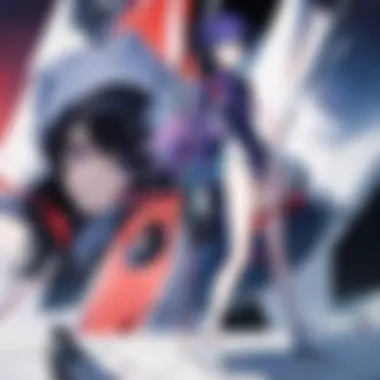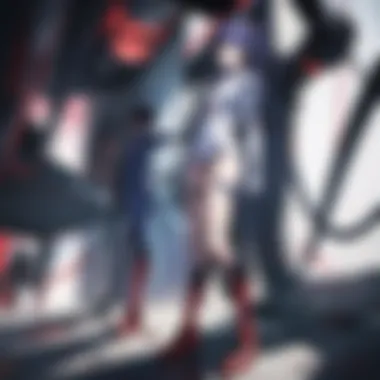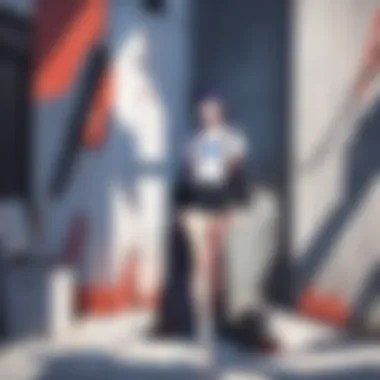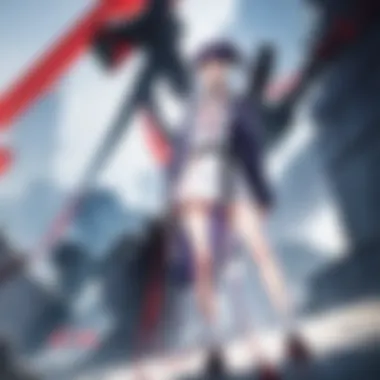Unveiling the Complexity of Evangelion Manga: A Detailed Analysis


Episode Reviews
In the exploration of the intricacies of the Evangelion manga, delving into each episode unveils a world of profound storytelling and character development. Each episode summary intricately weaves together a tapestry 🎨 of emotions, conflicts, and revelations. Analyzing key events sheds light on the narrative's depth, showcasing a blend of psychological drama and intricate plot twists. Discussions on character development offer a deep dive into the evolution of protagonists and antagonists, highlighting the intricacies of their choices and dilemmas. Memorable moments resonate with readers, leaving a lasting impact and sparking contemplation on the characters' inner motivations and outer challenges.
Character Spotlights
Amidst the complex narrative of Evangelion manga, character spotlights illuminate the personas that drive the story forward. Detailed background information provides insights into their origins, motivations, and personal journeys. Unveiling the personality traits and unique quirks of each character adds layers of depth to the storyline, enhancing the reader's understanding of their actions and decisions. Exploring the role of each character within the intricate plotline showcases their impact on the overarching narrative arc. Fan theories and speculations further enrich the discussion, fostering an engaging dialogue on potential character developments and hidden narratives within the story.
Anime vs. Manga Comparison
Comparing the anime adaptation with the original manga version unveils intriguing insights into the evolution of the storyline and characters. Analyzing plot differences between the two mediums highlights unique storytelling choices and adaptations for diverse audiences. Evaluating the art and animation quality offers a lens into the visual representation 🎥 of the intricate manga illustrations, sparking discussions on artistic interpretations and visual storytelling techniques. Examining character portrayals in both mediums showcases nuances in characterization and narrative pacing, prompting reflections on the impact of visual presentation on audience engagement. Fan preferences and opinions add a layer of complexity to the comparison, revealing diverse viewpoints on the effectiveness of each medium in portraying the essence of Evangelion.
Industry News and Updates
Staying abreast of industry news and updates within the realm of Evangelion manga provides valuable insights into upcoming releases and industry trends. Announcements on new releases offer anticipation and excitement for fans, unveiling glimpses of future story arcs and developments. Analyzing industry trends sheds light on the evolving landscape of manga production and audience preferences, providing context for the evolution of storytelling in the medium. Insight into the production process offers behind-the-scenes perspectives on the creation of manga, from conceptualization to distribution. Fostering a deeper understanding of the industry dynamics enhances the reader's appreciation for the intricacies of producing and consuming manga content.
Top Lists
Curating top 10 lists within the realm of Evangelion manga enables fans to rank favorite characters, episodes, and moments from the series. Ranking favorite characters unveils insights into audience preferences, shedding light on the popularity of diverse personas within the narrative. Compiling the best fight scenes showcases adrenaline-pumping moments of action and conflict, igniting discussions on the choreography and impact of these sequences. Contrasting different genres within anime and manga highlights the unique blend of storytelling elements present in Evangelion, offering readers a comprehensive view of the series' multifaceted narrative. Audience polls and feedback further enrich the lists, providing a collaborative space for fans to share their perspectives and engage in dialogue on the intricacies of the manga series.
Introduction to Evangelion Manga
History and Background
Delving into the history and background of Evangelion Manga unveils the genesis of a cultural phenomenon that has left an indelible mark on the manga landscape. Understanding the origins and contextual influences that shaped the creation of this work provides invaluable insights into its thematic richness and narrative depth. From tracing the creative vision of the mangaka to unraveling the socio-cultural backdrop against which this masterpiece emerged, this section navigates through the annals of time to illuminate the evolution of Evangelion Manga.
Influence and Legacy
The influence and legacy of Evangelion Manga reverberate throughout the realms of manga and popular culture, leaving an enduring impact on artistic expression and storytelling conventions. Examining the ripple effects of this seminal work on subsequent manga series and the broader landscape of media allows for a comprehensive appraisal of its significance. By dissecting how Evangelion Manga redefined genre boundaries and narrative tropes, readers gain profound insights into its lasting contributions to the artistic tapestry of the medium.
Manga vs. Anime Adaptation
The comparison between the manga and anime adaptations of Evangelion offers a fascinating glimpse into the divergent creative choices and narrative trajectories undertaken by the respective mediums. Exploring how the essence of the story is translated across different formats sheds light on the interpretative nuances and expressive capabilities inherent in manga and anime. By analyzing the strengths and weaknesses of each adaptation, readers can decipher the unique storytelling strategies employed to convey the nuanced themes and character dynamics of Evangelion within distinct visual and narrative frameworks.


Themes and Symbolism
In the expansive world of Evangelion manga, the exploration of themes and symbolism plays a pivotal role in unveiling the intricacies of the storyline. Themes and symbolism serve as the foundational elements that add depth and complexity to the narrative, inviting readers to delve beyond the surface level of the plot. By dissecting the themes interwoven throughout the manga, enthusiasts can uncover hidden meanings and messages that reflect on human experiences and emotions. The meticulous integration of themes and symbolism not only enhances the readers' comprehension but also serves as a creative tool for the mangaka to evoke thought-provoking dialogue. Understanding the significance of themes and symbolism in Evangelion manga is essential for enthusiasts seeking a profound and immersive reading experience.
Existentialism and Identity
Within the realm of Evangelion manga, the exploration of existentialism and identity delves into the essence of human existence and the search for self-identity. Characters grapple with existential crises, questioning their purpose in a chaotic world and confronting the realities of their own existence. The themes of existentialism interwoven with identity formation imbue the narrative with philosophical depth, prompting readers to ponder profound questions about life's meaning and personal identity. Through a psychoanalytic lens, the characters' internal struggles and external conflicts mirror the complexities of human psychology, offering a nuanced portrayal of the human condition.
Psychoanalytic Interpretations
Psychoanalytic interpretations in Evangelion manga provide a psycho-emotional landscape that delves into the characters' subconscious motivations and inner conflicts. The exploration of psychoanalytic concepts like repression, trauma, and the unconscious mind adds layers of psychological complexity to the characters' narrative arcs. By analyzing the characters' behaviors and choices through a psychoanalytic framework, readers can gain insights into their emotional struggles and underlying motives. The integration of psychoanalytic interpretations not only enriches the storytelling but also offers a profound exploration of human psyche and behavior within the context of the manga's narrative.
Religious Allegories
Religious allegories in Evangelion manga serve as symbolic representations that resonate with theological and philosophical concepts across various cultures and belief systems. The incorporation of religious imagery and motifs infuses the narrative with underlying metaphorical meanings and mythological allusions. Through religious allegories, the manga navigates themes of divinity, destiny, and existential transcendence, inviting readers to contemplate profound questions about faith, fate, and the human experience. The multi-faceted nature of religious allegories adds a compelling layer of depth to the narrative tapestry, enriching the readers' interpretation of the manga's thematic resonance.
Character Analysis
Character Analysis holds a significant position in this article on the Intricacies of Evangelion Manga as it serves as a crucial lens through which to understand the depths of the characters in the narrative. By delving into the intricacies of Shinji Ikari, Rei Ayanami, and Asuka Langley Soryu, readers can grasp the complexities of their personalities, motivations, and growth throughout the series. Analyzing these key characters allows enthusiasts to appreciate the nuances of their development and the impact they have on the overarching themes of Evangelion. Through a meticulous examination of their actions, dialogues, and relationships, the Character Analysis section provides valuable insights into the psychological and emotional dimensions of the story.
Shinji Ikari
Shinji Ikari, the protagonist of Evangelion, embodies a deeply troubled and introspective character whose struggles with his identity and purpose resonate with audiences. His journey from reluctance to bravery, self-doubt to self-acceptance, showcases a rich tapestry of human emotions and vulnerabilities. Delving into Shinji's psychological turmoil, his complex relationships with other characters, particularly his father Gendo Ikari, sheds light on his nuances and motivations. The exploration of Shinji Ikari in this section offers readers a profound understanding of his role as a pivotal figure in the narrative, influencing the overarching themes of isolation, existential crisis, and the search for connection.
Rei Ayanami
Rei Ayanami, an enigmatic and stoic character in Evangelion, captivates the audience with her mysterious aura and hidden depths. Her role as a pilot of the EVA units and her complex connection to NERV and Gendo Ikari pose intriguing questions about her origins and true identity. Through a nuanced analysis of Rei Ayanami, readers can uncover the layers of her personality, her struggles with self-discovery, and the impact of her actions on the unfolding events of the series. Exploring Rei's symbolism, her relationships with Shinji and other characters, offers a glimpse into the themes of loneliness, selflessness, and sacrifice in Evangelion.
Asuka Langley Soryu
Asuka Langley Soryu, with her fiery temperament and fierce determination, brings a dynamic energy to Evangelion's character roster. Her psychological complexities, stemming from a troubled past and a desire for validation, add depth to the narrative and create compelling conflicts within the story. By examining Asuka's confidence, insecurities, and growth throughout the series, readers can dissect her impact on the themes of ego, ambition, and vulnerability. The Character Analysis section dives into the intricate layers of Asuka Langley Soryu, showcasing her evolution as a character, her significance in Shinji's life, and her contribution to the broader existential questions raised in Evangelion.
Narrative Structure and Pacing
Non-Linear Storytelling


One of the distinctive features of Evangelion Manga is its non-linear storytelling approach. The narrative unfolds in a fragmented manner, blending past, present, and future events to create a multidimensional viewing experience. This unconventional storytelling technique challenges conventional storytelling norms and invites readers to piece together the puzzle of the narrative themselves. By integrating non-linear storytelling, Evangelion Manga achieves a level of complexity that intensifies the thematic exploration and character development.
Emotional Intensity
Emotional intensity is a defining characteristic of Evangelion Manga, driving the narrative forward with raw and visceral emotions. The series delves deep into the psychological intricacies of its characters, exposing their vulnerabilities, fears, and desires with unflinching realism. Through nuanced character interactions and internal struggles, Evangelion Manga evokes a range of emotional responses from readers, immersing them in a turbulent sea of feelings. The emotional depth portrayed in the series not only enriches the storytelling experience but also fosters a profound connection between the audience and the characters.
Plot Twists and Reveals
Plot twists and reveals are essential elements that keep readers on the edge of their seats while reading Evangelion Manga. The series is known for its unexpected plot developments, sudden revelations, and mind-bending twists that challenge viewers' perceptions of the story. These narrative devices serve to subvert expectations, create suspense, and elevate the overall impact of the storytelling. By incorporating clever plot twists and well-crafted reveals, Evangelion Manga maintains a sense of intrigue and unpredictability that sets it apart from conventional narratives.
Critical Reception and Fan Theories
In this section of the article, we delve into the critical reception and fan theories surrounding the Evangelion manga, dissecting the intricate layers of analysis and interpretation that have fueled scholarly discourse and fan speculation. It is paramount to grasp the significance of critically examining the reception of a piece of work like Evangelion, given its complex themes and narrative depth. By exploring the varied viewpoints and critiques from academia and fans alike, we can gain a deeper understanding of the manga's impact on popular culture and intellectual circles.
Academic Discourse
Freudian Analysis
Freudian analysis plays a pivotal role in dissecting the psychological underpinnings of Evangelion's characters and narrative arcs. The exploration of repressed desires, Oedipal complexes, and subconscious motivations elucidates the complexities of Shinji, Rei, and Asuka's inner worlds. Freudian analysis offers a lens through which to interpret the characters' behaviors and choices, shedding light on the underlying psychological turmoil depicted in the manga. While Freudian analysis provides valuable insights into the characters' psyches, it is essential to acknowledge its limitations in capturing the full breadth of Evangelion's philosophical and existential themes.
Postmodern Interpretations
Postmodern interpretations bring a fresh perspective to the analysis of Evangelion, emphasizing the deconstruction of conventional storytelling tropes and narrative structures. By framing Evangelion within a postmodern lens, scholars and fans can explore the interplay of reality and fantasy, decentered narratives, and metafictional elements present in the manga. The postmodern lens allows for a deeper exploration of Eva's subversion of traditional mecha anime tropes and its thematic exploration of individual agency and existential crises. However, while postmodern interpretations offer valuable insights into Eva's narrative complexity, they may overlook the emotional and psychological depth that traditional analyses provide, showcasing the multifaceted nature of interpreting Evangelion manga.
Artistic Style and Visual Representation
In the realm of the Evangelion manga, the significance of Artistic Style and Visual Representation cannot be overstated. These elements serve as the bedrock upon which the entire visual world of the series is constructed. The meticulous attention to detail in character designs, backgrounds, and mecha illustrations breathes life into the narrative, immersing the readers in a visually stunning universe. Through a fusion of intricate line work, shading techniques, and dynamic compositions, the artist captures the essence of each character and setting with unparalleled depth.
Artistic Style and Visual Representation play a pivotal role in conveying the emotions and psychological states of the characters. From subtle facial expressions to elaborate battle sequences, every visual component is carefully crafted to evoke specific moods and responses from the audience. The use of symbolism and visual metaphors enhances the storytelling, adding layers of complexity and nuance to the narrative. By exploring the interplay between artistry and storytelling, readers gain a deeper appreciation for the thematic undertones and character dynamics within the Evangelion manga.
Character Designs
Yoshiyuki Sadamoto's Influence
Yoshiyuki Sadamoto's Influence on the character designs of Evangelion manga is profound and far-reaching. As the original character designer for the series, Sadamoto's artistic vision shapes the iconic personalities of Shinji, Rei, Asuka, and others. His distinctive style blends realism with a touch of surrealism, giving each character a unique and memorable presence on the page.


One key characteristic of Yoshiyuki Sadamoto's Influence is his ability to infuse subtle nuances into the characters' visual appearances, reflecting their inner struggles and complexities. Through detailed facial expressions, body language, and costume design, Sadamoto brings a sense of authenticity and depth to the characters, enriching their development throughout the story. His emphasis on fluidity and grace in motion adds a layer of dynamism to the artwork, capturing the character dynamics with fluidity and intensity.
The unique feature of Yoshiyuki Sadamoto's Influence lies in his adeptness at balancing realism with artistic interpretation, creating characters that resonate with readers on an emotional level. While there may be challenges in maintaining consistency across different panels and scenes, Sadamoto's meticulous attention to detail ensures that the characters remain visually compelling and engaging. Overall, Yoshiyuki Sadamoto's Influence elevates the visual storytelling of Evangelion manga, enhancing the overall thematic impact and reader experience.
Comparative Analysis with Other Manga
In the vast landscape of manga, undertaking a comparative analysis with other works holds paramount significance in this exploration of Evangelion intricacies. This section delves into a crucial aspect of dissecting Neon Genesis Evangelion in relation to other manga series, shedding light on distinctive elements, thematic parallels, and narrative innovations. Through this comparative lens, readers gain a deeper appreciation of Evangelion's unique position within the manga realm. By juxtaposing Evangelion against its counterparts, we unveil the layers of complexity and thematic depth that set this iconic series apart.
Neon Genesis Evangelion vs. Other Mecha Series
Comparing Neon Genesis Evangelion to other mecha series unveils a fascinating tapestry of themes, character dynamics, and narrative techniques. Unlike traditional mecha narratives that emphasize heroic battles and futuristic technologies, Evangelion transcends these conventions by delving into existential crises, psychological traumas, and profound philosophical inquiries. This section navigates the nuances of Evangelion's narrative approach, contrasting it with the archetype-laden narratives of classic mecha series. By examining how Evangelion redefines the boundaries of the mecha genre, readers gain insight into its critical acclaim and enduring relevance in the realm of manga.
Psychological Depth in Manga
Delving into the realm of psychological depth in manga illuminates a crucial aspect of storytelling that resonates deeply with readers. This subsection explores how manga, including Neon Genesis Evangelion, delves into the complexities of human psychology, emotional traumas, and existential dilemmas. By unraveling the layers of psychological depth present in Evangelion and other manga works, readers embark on a cerebral journey that probes the depths of character motivations, narrative structures, and thematic explorations. Through the intricate interplay of visual storytelling and narrative symbolism, manga cultivates a profound space for introspection and intellectual engagement, captivating audiences with its thought-provoking portrayals of the human psyche.
Exploration of Fan Culture
In this segment of the article, we delve into the significant aspect of exploring fan culture within the realm of the Evangelion manga. Fan culture plays a pivotal role in shaping the perception and reception of any media franchise, and Evangelion is no exception. It is imperative to understand the multifaceted layers of fan culture to appreciate the full extent of the impact and reach of the manga.
Cosplay and Fandom Events
Cosplay and fandom events serve as vibrant avenues for enthusiasts to immerse themselves in the world of Evangelion. Cosplay allows fans to embody their favorite characters with meticulous attention to detail, showcasing dedication and creativity. From meticulously crafted costumes to elaborate conventions, cosplay fosters a sense of community and camaraderie among fans, elevating their connection to the narrative and characters.
Online Communities and Forums
Online communities and forums act as virtual meeting grounds for Evangelion aficionados to discuss theories, interpretations, and share their passion for the manga. These platforms provide a space for fans to engage in deep conversations, cultivate friendships, and expand their knowledge of the intricate themes and symbolism present in Evangelion. Through active participation in online discussions, fans can explore diverse perspectives and gain new insights into the intricacies of the manga.
Fan Fiction and Artwork
Fan fiction and artwork showcase the creative ingenuity and emotional investment of fans in the Evangelion universe. Through fan fiction, enthusiasts can reimagine scenarios, develop character relationships, and explore untapped narratives within the manga's framework. The artwork produced by fans reflects their deep connection to the characters and storylines, offering unique interpretations and fresh perspectives on the complex world of Evangelion. These fan creations not only demonstrate artistic talent but also contribute to the vibrant tapestry of fan culture, enriching the overall experience for fellow enthusiasts.
Reimaginings and Reboots
Within the realm of Evangelion manga, the realm of reimaginings and reboots offers a fertile ground for creative exploration and narrative reinvention. The concept of reimagining beloved characters and plotlines from a fresh perspective not only reinvigorates the franchise but also stimulates audience engagement by presenting alternative interpretations and narratives. Reboots serve as a means to breathe new life into familiar stories, offering creators the opportunity to experiment with narrative structures, character dynamics, and thematic elements in ways that challenge conventional expectations.
Evangelion's reimaginings and reboots have the potential to push boundaries and reimagine established conventions, creating a dynamic landscape where familiar elements are recontextualized to provide fresh insights and emotional resonance. By revisiting core themes such as existentialism, identity, and human connection through a different lens, reboots can offer audiences a deeper appreciation of the complexities present within the original narrative while introducing novel perspectives that expand the series's thematic depth.
Furthermore, reimaginings and reboots present an opportunity to address evolving cultural and societal norms, allowing creators to infuse contemporary relevance into the series while preserving its timeless appeal. Through thoughtful reexamination of character motivations, interpersonal relationships, and societal critiques, reboots can engage with current audiences in meaningful ways, sparking dialogue and reflection on universal themes that transcend time and space.
In essence, the realm of reimaginings and reboots in Evangelion manga underscores the series's adaptive nature and its capacity for continuous evolution. By embracing the creative potential of reinterpreting established narratives and characters, creators can craft narratives that resonate with audiences on a profound level, inviting them to revisit familiar worlds with newfound appreciation and wonder.







